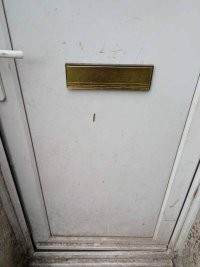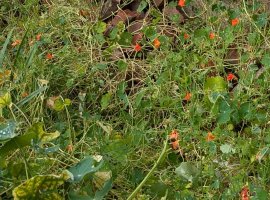You are using an out of date browser. It may not display this or other websites correctly.
You should upgrade or use an alternative browser.
You should upgrade or use an alternative browser.
Butterflies and moths
- Thread starter campanula
- Start date
Buff ermine I think gentlegreen ?
Epona
Sonic: 1 Nov 2006 - 8 Jan 2022
What was this poor, old tatty Vanessa atalanta (Red Admiral) doing in Greater Croydon yesterday, January 27th!
View attachment 410010
Although most migrate, some try to hibernate here, and I bet that is some poor bewildered thing who has been confused by the unseasonably warm sunny weather last week and woke up too early

BoatieBird
Well-Known Member
I found a red admiral in the living room yesterday, we seem to get a couple in the house every winter.
I'm never sure what to do with them - find them a quiet spot in the house? put them outside? maybe in the greenhouse or shed?
I'm never sure what to do with them - find them a quiet spot in the house? put them outside? maybe in the greenhouse or shed?
StoneRoad
heckling from the back!
Hmmm - Epona does that apply to small tortishells ?Having looked it up, they apparently don't enter a fully dormant state if they stay here (some butterfly species do), they will become active on sunny days even during the winter!
Fascinating creatures
because they're the ones I usually find !
Epona
Sonic: 1 Nov 2006 - 8 Jan 2022
View attachment 424725
Got a bunch of these flying about, I guess they're mating, never seen a moth with such antennae before.
Found some info about them for you - apparently this time of year you get large groups of males "dancing" to warm themselves in the sun
Nemophora degeerella | NatureSpot
stethoscope
Well-Known Member
brogdale
Coming to terms with late onset Anarchism
Artaxerxes
Look out, he's got a gnu!
Love mint months
We've been getting tiger moths around here last week or so
We've been getting tiger moths around here last week or so
stethoscope
Well-Known Member
First time I've managed to video a Hummingbird Hawkmoth (at lavender fields today).
gentlegreen
I hummus, therefore I am ...
My lovely riot of self-sown nasturtiums in the front garden is being decimated by cabbage white caterpillars that are climbing up inconvenient surfaces to pupate.
Clearly not enough predators - no birds and just a very few wasps ...
Clearly not enough predators - no birds and just a very few wasps ...
Attachments
stethoscope
Well-Known Member
Saw a Painted Lady today, but only three this year - unlike 5 years ago when there hundreds coming in off the east coast.Anyone seen a Clouded Yellow or a Painted Lady recently?
Not seen a Clouded Yellow since one on a holiday on the Norfolk Broads about 15 years ago! But I know the south does get some migrants every year.
Whats been noticeably absent up here this summer are Small Tortoiseshells.
gentlegreen
I hummus, therefore I am ...
gentlegreen
I hummus, therefore I am ...
I'm fairly sure I spotted a comma or two this year, but my hops are pretty well unscathed - having grown them for over 20 years, they're usually shredded by now - when I glimpsed this one out of the window I expected it to be a comma.
EDIT:-
A few hours later and a comma came and sat on my leg - of course I didn't have my phone with me

EDIT:-
A few hours later and a comma came and sat on my leg - of course I didn't have my phone with me


Last edited:
StoneRoad
heckling from the back!
Not actually done the flutterbye census this year ...
but I can safely say I've seen very few b/flies and moths this year.
Some red admirals, gatekeepers/wall browns have been about all I've noticed.
Although the fell behind the house had an overdose of micromoths a couple of weeks ago, which I failed to ID.
but I can safely say I've seen very few b/flies and moths this year.
Some red admirals, gatekeepers/wall browns have been about all I've noticed.
Although the fell behind the house had an overdose of micromoths a couple of weeks ago, which I failed to ID.
Southlondon
The river's there for a reason
All our native insects are under immense strain , and biodiversity is on the edge of the cliff. Anyone even slightly concerned about global warming should be absolutely terrified about the decline in biodiversity which is on the verge of collapse. UK is the least wooded country in Europe and has the worst biodiversity in Europe.
As all the gardens in Britain cover a larger acreage than all the national parks put together, we can all take action to help save insects and this fauna and flora in general.
This is the time of the year to do something to help butterflies and moths who will be getting ready to hibernate or their pupae will be dropping to the ground or clinging to the dead plant matter to over winter.
Clear up the leaf litter and cut down the dead perennial stalks and you are culling next years beautiful moths and butterflies.
Don’t waste money on twee little insect hotels under the misguided belief that they are the best way to help insects. A lot of them are made of treated wood which by definition is toxic to insects, instead place a few part buried logs or branches with a pike of twigs and leave on top and dot a few pikes of stones and twigs around your garden which the insects will far prefer.
Never mind no now may, try to leave a small area at least of uncut grass, pile up fallen leaves under shrubs ( it’s the very best kind of mulch anyway, and it’s free!)
Celebrate native plants which are of far more use to wildlife than exotic looking foliage better suited to the Brazilian rain forest, and avoid double blooms.
There is no such classification as weeds, it is a term created by the multi £billion gardening industry to describe native plants.
Native plants usually require no double digging, fertiliser, excessive watering or even compost to grow which of course is a good reason the gardening industry doesn’t properly promote them.
Work with the soil you have rather than amending it constantly to try artificially recreate conditions to suit non native or non-regional plants.
Celebrate when leaves show signs of having been munched because it means an insect like them as opposed to plants whose leaves remain suspiciously intact throughout the season, probably because they offer nothing of value to wildlife.
Enjoy the beauty of a garden buzzing with life, rather than a sterile ever blooming wildlife desert, maintained with poisons and soil destruction.
As David Attenborough said
“If all the mammals on earth died out tomorrow, there’s would carry on quite fine.
However, should all the insects die out there is no future for life on earth. “
As all the gardens in Britain cover a larger acreage than all the national parks put together, we can all take action to help save insects and this fauna and flora in general.
This is the time of the year to do something to help butterflies and moths who will be getting ready to hibernate or their pupae will be dropping to the ground or clinging to the dead plant matter to over winter.
Clear up the leaf litter and cut down the dead perennial stalks and you are culling next years beautiful moths and butterflies.
Don’t waste money on twee little insect hotels under the misguided belief that they are the best way to help insects. A lot of them are made of treated wood which by definition is toxic to insects, instead place a few part buried logs or branches with a pike of twigs and leave on top and dot a few pikes of stones and twigs around your garden which the insects will far prefer.
Never mind no now may, try to leave a small area at least of uncut grass, pile up fallen leaves under shrubs ( it’s the very best kind of mulch anyway, and it’s free!)
Celebrate native plants which are of far more use to wildlife than exotic looking foliage better suited to the Brazilian rain forest, and avoid double blooms.
There is no such classification as weeds, it is a term created by the multi £billion gardening industry to describe native plants.
Native plants usually require no double digging, fertiliser, excessive watering or even compost to grow which of course is a good reason the gardening industry doesn’t properly promote them.
Work with the soil you have rather than amending it constantly to try artificially recreate conditions to suit non native or non-regional plants.
Celebrate when leaves show signs of having been munched because it means an insect like them as opposed to plants whose leaves remain suspiciously intact throughout the season, probably because they offer nothing of value to wildlife.
Enjoy the beauty of a garden buzzing with life, rather than a sterile ever blooming wildlife desert, maintained with poisons and soil destruction.
As David Attenborough said
“If all the mammals on earth died out tomorrow, there’s would carry on quite fine.
However, should all the insects die out there is no future for life on earth. “
stethoscope
Well-Known Member
Actually spotted a Small Tortoiseshell today. Hardly seen any this year up here and here we are into late summer.

Was thinking about @campanula's OP on this thread earlier. Although I've not been fortunate myself to have seen any, there's been plenty of sightings of Clifden Nonpareil moths and a large influx of migrant Convolvulus Hawkmoths the last few weeks. And with the Jersey Tiger, increasingly being seen northerly too.

Was thinking about @campanula's OP on this thread earlier. Although I've not been fortunate myself to have seen any, there's been plenty of sightings of Clifden Nonpareil moths and a large influx of migrant Convolvulus Hawkmoths the last few weeks. And with the Jersey Tiger, increasingly being seen northerly too.
Similar threads
- Replies
- 100
- Views
- 3K












